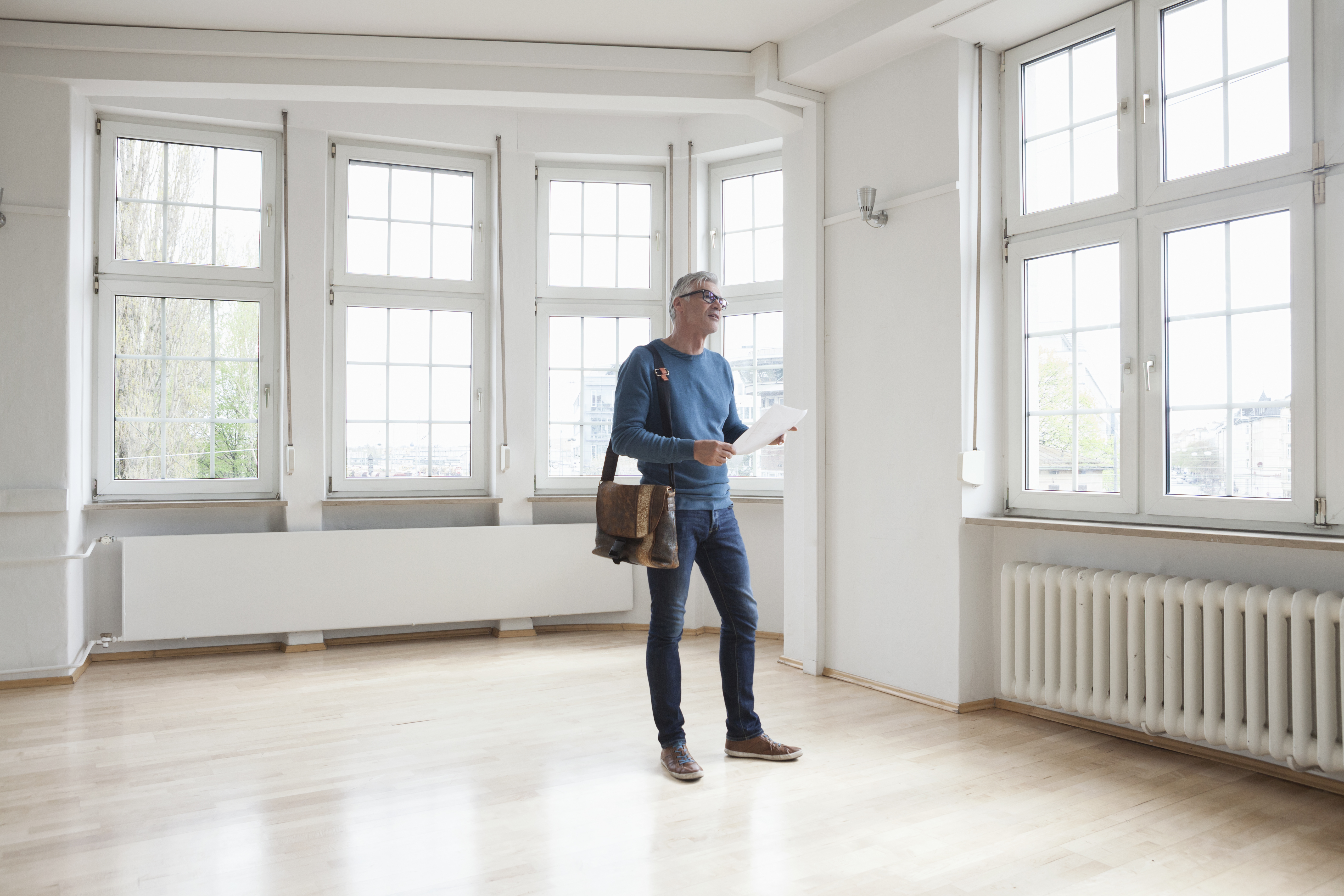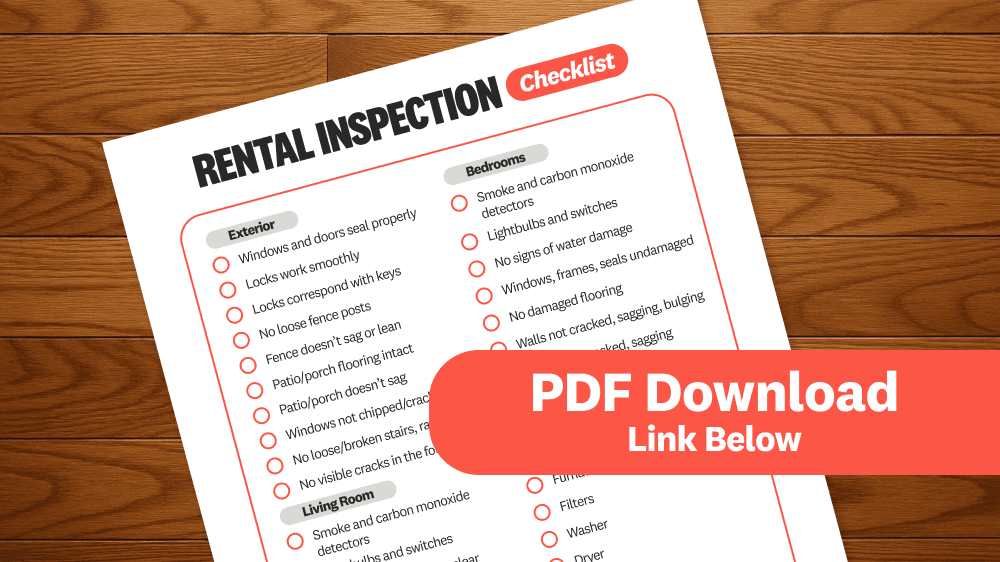
An attic inspection can confirm structural components, insulation, and home systems are all in order. Learn about attic inspection costs and what to know.
Everything you need to ensure your property is up to code


Owning a rental property comes with an extensive to-do list, and one of the most important duties is the safety inspection. Complying with local property inspection guidelines protects your asset, maintains its value, and leads to a safe and happy experience for tenants. To make things easier, we’ve compiled a simple rental property inspection checklist below.
In contrast to when a rental property needs renovations, a property inspection requires few tools and supplies. Here are a few inexpensive items that will make the inspection easier:
Notebook
Measuring tape
Flashlight
Voltage tester
Camera (to document issues)
Screwdriver
Gloves
Step ladder

It’s important to stay on top of things as a landlord or property manager, especially during a meticulous task like a property inspection. Missing one small detail—like a sign of water damage or a wobbly step—could have large consequences.
A surefire way to account for every detail is to work methodically, checking items off the list room by room rather than assessing the property as a whole. Here’s a bulleted list of the key things to look for during an inspection, organized by room.
Smoke and carbon monoxide detectors work when tested and have new batteries
Lights turn on and off
Fireplace is clear of obstructions, buildup, and is far from flammable items
Windows are undamaged and seal properly when closed
No signs of water damage on floor, walls, or ceiling
No ripped carpeting or damaged flooring
No cracks, sagging, or bulges on walls or ceiling
No signs of bugs or pests
Microwave turns on and off and doesn’t rattle
Refrigerator is on, cold, and free of condensation
Oven turns on and doesn’t emit strange noises or odors
Dishwasher runs and doesn’t leak
Sink and garbage disposal drain quickly and emit no strange odors
Lights turn on and off
Smoke and carbon monoxide detectors work when tested and have new batteries
Fire extinguisher is easy to access and up to date
No signs of water damage on floor, walls, or ceiling
No cracks, sagging, or bulges on walls or ceiling
No signs of bugs or pests in cupboards or on countertops
Toilet flushes without leaking, clogging, or running
Sink drains quickly, and faucet pours without sputtering or leaking
Shower turns on without leaking and fully drains
Overhead fan turns on and off, and is clear of debris behind the vent cover
Lights turn on and off
No signs of water damage on floor, walls, or ceiling
No signs of mold on floor, walls, ceiling, or grout
No cracked or damaged flooring or tiles
No cracks, sagging, or bulges on walls or ceiling
No cracks, chips, or discoloration on mirrors
No signs of bugs or pests
Smoke and carbon monoxide detectors work when tested and have new batteries
Lights turn on and off
No signs of water damage on floor, walls, or ceiling
Windows are undamaged and seal properly when closed
No ripped carpeting or damaged flooring
No cracks, sagging, or bulges on walls or ceiling
No signs of bugs or pests
HVAC has consistent airflow and doesn’t emit strange noises or odors
Furnace filters have been replaced per manufacturer guidelines
Sump pump drains and doesn’t emit strange noises or odors
Lights turn on and off
Washer/dryer turns on and doesn’t leak or emit strange noises
No mold or mildew on floor, walls, or ceiling
No visible cracks in the foundation
No signs of rodents or insects (droppings, nests, or bite marks) on floor, walls, or ceiling
Hallways and stairwells are free of clutter
Fire extinguisher is easy to access and up to date
Smoke and carbon monoxide detectors work when tested and have new batteries
Lights turn on and off
No ripped carpeting or damaged flooring
No signs of water damage on floor, walls, or ceiling
No signs of bugs or pests
No loose or broken stairs or railings
Windows and doors seal properly when closed
Locks work smoothly when tested and correspond with keys
Fencing has no loose posts and doesn’t sag or lean
Patio/porch has intact flooring and doesn’t sag in any spots
No chips, cracks, or discoloration on windows
No loose or broken stairs or railings
No visible cracks in the foundation
For simplicity and peace of mind, many property owners hire professional home inspectors in their area to conduct inspections. The average cost of a home inspection ranges from $200 to $500, depending on the property’s size, location, condition, and the reason for the inspection.
The primary benefit of inspecting a rental property yourself is that it’s more cost-effective than hiring a professional. Property managers who have overseen the same property for a long time likely have a keen sense of what to look for during an inspection, too. In this case, the DIY route might be the best option.
However, hiring a rental property inspector offers several benefits. Professional inspectors are trained in safety regulations and local building codes, so they know exactly what to look for during an inspection. Delegating the task also saves time, especially for individuals who own multiple rental properties. Lastly, scheduling regular inspections helps prevent legal issues and ensures a safe environment for tenants.
From average costs to expert advice, get all the answers you need to get your job done.

An attic inspection can confirm structural components, insulation, and home systems are all in order. Learn about attic inspection costs and what to know.

If you’re buying a home, having an inspection offers reassurance that it’s in good condition. How much a home inspection costs varies depending on the home's size, age, condition, and location.

Drone roof inspection costs vary depending on the roof’s size, complexity, and material. Use this guide to budget for a drone roof inspection.

Even a well-maintained home can have hazards for older adults. Learn how home inspections can help you reduce risks and stay safely in your home.

When you’re building a new home, it’s a good idea to get multiple inspections. Learn about the benefits of a pre-drywall inspection during construction.

In a highly competitive market, you may wonder if waiving the home inspection is a good idea. Learn why it’s often not and what to consider before you do.